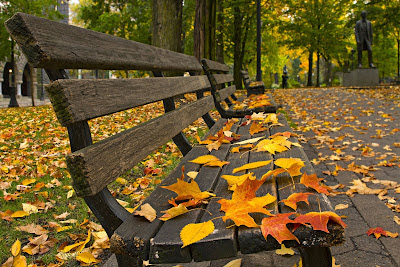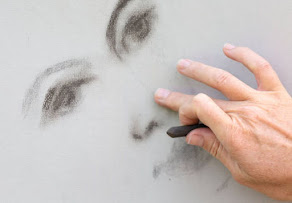Her house was some distance from the city where she worked. Visitors almost never came to call, so she spent most of her time by herself. Writing of any kind helped keep the loneliness and isolation at bay. She wanted to share thoughts and discoveries with someone, though, which is how the letters first began. They filled a deep need. But over the years, the contact developed into more for her than just casual conversing—much more: it became deeply interwoven into her life.
Her writing desk was in front of a large window. She had put the desk there on purpose. The garden she had planted and worked in at least a little every day was one of her great joys; through that particular window she could view it best, all the year round. In spring and summer, the sun’s warmth poured in onto the desk, the chair, and her; in fall and winter, the wind made patterns with the storm clouds, and the sound of falling rain was soothing. In the day she enjoyed the colors of the plants and the sky; at night, moonlight put a silver wash over everything, or darkness made shadowy shapes. All times and seasons fed her imagination.
Between letters, she spent many hours at her desk, writing simple, old-fashioned stories that no one wanted to publish. They were “bland, boring, unexciting”, she was told. In her heart, she didn’t really believe that; nevertheless, it was discouraging. But she could never bring herself to write the sorts of stories that were being accepted for publication. They were trash, in her opinion, and they disturbed her deeply; she felt that they couldn’t possibly be good for anyone to read. If writing things like that was the price to pay for being published, then she would remain unpublished forever. She continued to write the kind of stories she wanted to write; perhaps one day someone would appreciate and enjoy them.
That late afternoon she looked out the window and saw flowers everywhere: yellow sunflowers beginning to open; red geraniums in earthenware pots; pink and purple hydrangea bushes framing the window. Her freesias and daffodils were finished for the year, but daylilies had taken their place. Marigolds, daisies, forget-me-nots, alyssum--wherever there was room for them, flowers grew.
Her garden produced beauty; her letters and stories produced uncertainty. It was an interesting, if disheartening, contrast.
Sophie looked back down at the letter in front of her. In most of them, she included reflections about her days or shared what she hoped would be amusing or distracting anecdotes. She asked questions which would probably never be answered, but she asked them anyway; one never knew, after all. From time to time she wondered why she continued to do this. Why indeed? Maybe this should be the last letter. She’d said that before, too, many times…but she did know why she wrote them and knew that she would probably keep on writing. She was good at making up excuses for his silences; she even found herself believing the excuses after a while. A wry smile crossed her face at that admission while she folded her letter.
She slipped the letter into its envelope, sealed and addressed it, and then put on a stamp. Although the mail truck had almost certainly gone by, she could still put the letter into the mailbox and raise the little red flag. She always enjoyed doing that; it was like one of her old-time stories come to life. Sometimes she wished that real life was more like those stories; sadly, most of it was like the ugly and depressing ones now being published.
She went through the living room to the front door, out onto the porch, and down the steps; it was only a short walk across the front yard to the mailbox by the gate. Everything was peaceful and still in her garden. It had been a beautiful day, with large white clouds moving slowly across a deep blue sky. What a lovely painting that would have made, she thought; she had described it in her letter. The shadows were lengthening now and the sky was turning pale, as the afternoon slowly advanced into evening.
She reached the gate and opened the mailbox, expecting it to be as empty as it usually was, apart from ads and bills. But today it wasn’t empty; today there was something different inside: a padded envelope nearly filling the space. Sophie took it out of the mailbox and then stood still when she saw who it was from. She stared at it, hardly believing what she was seeing. She seldom received anything from him other than a few cherished postcards or brief notes. What could this be?
Sophie turned the envelope over and opened it carefully. Between two pieces of cardboard was a photo folder; slipped into the opening was a small watercolor painting of a handful of flowers. There were daffodils, as brilliant yellow as the sunshine through her window; fragile freesias, in orange and pink, red and purple; and tiny blue forget-me-nots on thin green stems. The colors glowed intensely, as if bright sunlight was shining through each petal. She smiled with surprise and delight while she looked at the beautiful image. The flowers in the painting were as lovely as the real ones scattered throughout her garden--more so to her, considering the source. And these flowers would last forever; these colors would never fade.
She walked slowly back towards the front porch, still looking at the delicate painting. Her own letter couldn’t be mailed yet; she wanted to tell him how much happiness he’d given her with this gift of flowers. She began thinking about how she would say that…
Upon entering the house, Sophie went back to her desk and sat down with the painting in her hand. The writing on the envelope was the same as on the small stack of notes she kept in a desk drawer, but there had never been a gift before, and such a gift. It had been painted for her! From her own descriptions of some of her favorite flowers! It was totally unexpected, and therefore doubly to be treasured.
She knew where it would go--on the desk right in front of her where she could see it always. Somewhere in the house there was a small picture stand, but she would find it later. At the moment all she wanted to do was look at the painting, and think about the work that went into it, the time that went into it, the hands that created it. But why had he sent this? What did it mean? Anything? Or nothing? She wished she knew the answer.
Then she noticed that the painting had become slightly askew in the folder. She took it out to straighten it and discovered that it wasn’t a painting after all—it was a greeting card. She looked blankly at the printed information on the back, and then opened it. There was a hand-written message inside: “This card company accepted some of my work. Good quality materials & reproduction. Looks real, doesn’t it? Could almost fool people.” She read and reread the words, as the joyful happiness faded inside her. She could think of nothing to say in response that wouldn’t show her to be a complete idiot. After putting the card and her letter on the desk, she leaned back in her chair.
She sat for a long time in silence, while the sun went down and twilight shadowed her garden; the bright colors became only memories. Then she took a deep breath and reached over to her old CD player to click it on, pressing the button until she found the track she wanted: “Moonlight Waltz”. In a moment, the solo piano notes floated out into the room, romantic and sweet, but painfully sad.
As she sat, filled with emptiness, she imagined being asked to dance; imagined saying “yes”; imagined standing up and moving into his arms, the strong, artistic hands holding her and guiding her steps as she held onto him, leaning into his warmth. She closed her eyes and fell into the music, lost once again in familiar dreams and fantasies… all the while knowing the answer to her earlier question: that no matter how deeply she cared, it would never really mean anything.
It would always mean nothing.
_______________________________________________________________________________
Copyright 2022, Mary M. Isaacs. From a forthcoming book









No comments:
Post a Comment